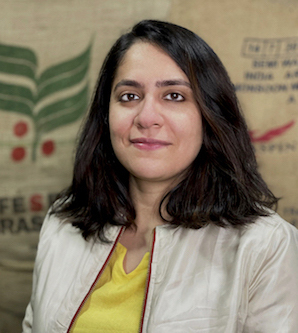Staff profile

| Affiliation |
|---|
| Associate Professor in South Asian History in the Department of History |
Biography
I am primarily a historian of gender and culture in South Asia. Born and raised in New Delhi (India), my family roots lie in west Punjab (Pakistan), where all my grandparents were born, prior to the Partition of 1947. These intersections of family history with the ‘big’ moments of political history are what drew me to History as a discipline.
During my BA and MA at Delhi University, and my MPhil at Jawaharlal Nehru University (JNU) in Delhi, I learned to seek out quotidian and micro histories, beyond conventional political history narratives. At JNU, I explored the longue durée shifts in north India’s oldest classical music festival in the Punjabi city of Jalandhar: a micro-history of music in one city. I then adopted a more macrohistorical perspective by examining music’s social history for the entire Punjab region for my PhD at King’s College London, which was shortlisted for the Royal Asiatic Society’s Bayly Prize. My first book, Music in Colonial Punjab: Courtesans, Bards, and Connoisseurs (OUP 2023), is based on this doctoral research, and features a diverse cast of figures, from musicians, bards and courtesans, to kings, colonisers, missionaries, scholars and social reformists.
My current research is on the impact of the 1947 Partition on musicians’ lives in India and Pakistan, and was begun during my Leverhulme Early Career fellowship at the University of Sheffield (2019-2022). This research (ongoing) will feed into my second monograph on musical memories of the Partition, focussed on the history of musical exchange across the Indo-Pak border in both South Asia and the British diaspora since 1947. The Commonwealth Scholarships Commission, the Institute for Historical Research (the Isobel Thornley fellowship), and the Leverhulme Trust have funded my research so far.
The public-facing aspect of research and teaching has always motivated me, having partnered with a range of institutions, including The British Library, the Portico Library (Manchester), the AHRC’s Being Human and the Migration Matters Festivals (Sheffield), the Herbert Museum (Coventry), the UK Punjab Heritage Association, the South Asian Heritage Month, BBC Radio Yorkshire, among others.
I welcome doctoral students in the following areas of South Asia:
- social, cultural and gender histories
- migration, displacement and borderlands
- conflict, decolonisation and culture
- histories of performance
- the political and historical contexts of cultural expression
- histories of emotion and affect
- ecology, environment and culture
International Collaborations
I am an editor on a special issue on ‘Ecology, Music and Community: Exploring Performance in South Asia’ for the South Asia: Journal of South Asian Studies (with Dr Priyanka Basu, December 2022), and the edited book volume Punjab Sounds: In and Beyond the Region (with Dr Vebhuti Duggal, forthcoming, Routledge, New York). I am also a co-investigator on ‘The Travelling Female Performer: Mobility and Agency in and beyond South Asia, c. 1760-1940,” an ongoing project (with Prof Shweta Sachdeva Jha and Dr Jennifer Howes).
Research interests
- Borderlands
- Cultural and Social History
- Empire and Imperialism
- Environment and Ecology
- Ethnomusicology
- Film and Media Studies
- Gender History
- Migration
- Performance Studies
Publications
Authored book
- Music in Colonial Punjab: Courtesans, Bards, and Connoisseurs, 1800-1947Kapuria, R. (2023). Music in Colonial Punjab: Courtesans, Bards, and Connoisseurs, 1800-1947.
Chapter in book
- Music and its Many Memories: Complicating 1947 for the PunjabKapuria, R. (2017). Music and its Many Memories: Complicating 1947 for the Punjab. In Partition and the Practice of Memory. https://doi.org/10.1007/978-3-319-64516-2_2
Edited book
- 'Performing' nature : ecology and the arts in South AsiaBasu, P., & Kapuria, R. (Eds.). (2025). ’Performing’ nature : ecology and the arts in South Asia.
- Punjab Sounds: In and Beyond the RegionKapuria, R., & Duggal, V. (Eds.). (2025). Punjab Sounds: In and Beyond the Region. https://doi.org/10.4324/9781003406983
Journal Article
- Strains of friendship: post-partition rāgadārī music publics in LondonKapuria, R. (2024). Strains of friendship: post-partition rāgadārī music publics in London. South Asian Diaspora, 16(2), 187-210. https://doi.org/10.1080/19438192.2023.2258647
- Introduction: Ecology, Music and Community—Exploring Performance in South AsiaBasu, P., & Kapuria, R. (2022). Introduction: Ecology, Music and Community—Exploring Performance in South Asia. South Asia: Journal of South Asian Studies, 45(6). https://doi.org/10.1080/00856401.2022.2113660
- Singing the River in Punjab: Poetry, Performance and FolkloreKapuria, R., & Kumar, N. (2022). Singing the River in Punjab: Poetry, Performance and Folklore. South Asia: Journal of South Asian Studies, 45(6). https://doi.org/10.1080/00856401.2022.2124680
- Of Music and the Maharaja: Gender, affect, and power in Ranjit Singh's LahoreKapuria, R. (2020). Of Music and the Maharaja: Gender, affect, and power in Ranjit Singh’s Lahore. Modern Asian Studies, 54(2). https://doi.org/10.1017/s0026749x18000446

